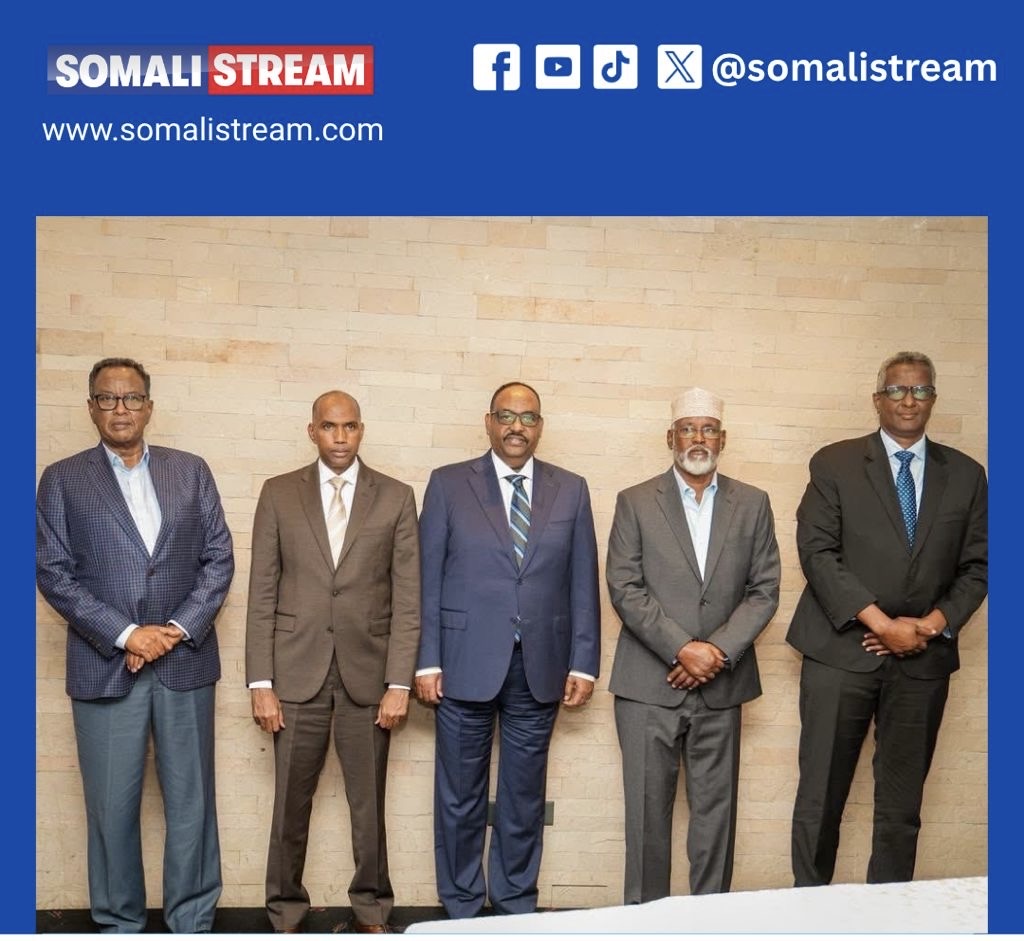In a politically seismic move with the potential to reshape Somalia’s fragile federal balance, two of the country’s most powerful regional kingpins, Puntland’s President Said Abdullahi Deni and Jubaland’s Ahmed Mohamed Islam “Madobe”have joined a new high-level political alliance in Nairobi, signaling the formation of a formidable counterweight to the administration of President Hassan Sheikh Mohamud in Mogadishu.
The Nairobi meeting, held behind closed doors for several hours, brought together former Prime Ministers
Abdi Farah Shirdon (Saacid) and Hassan Ali Khayre, Member of Parliament and perennial presidential contender Abdirahman Abdishakur, and other influential figures from the Somali political spectrum.
This coalition, now dubbed the Somali National Future Council, represents the clearest signal yet of a coordinated effort to undermine Villa Somalia’s current trajectory ahead of next year’s critical national elections.
Formation of the Somali National Future Council
At the heart of the gathering was the announcement of the Somali National Future Council (Golaha Mustaqbalka Soomaaliya) a newly minted political platform uniting regional presidents, prominent federal politicians, and dissenting elites under a shared vision: to “rescue” Somalia from what they describe as deteriorating governance, increasing authoritarianism, and growing political centralization under President Hassan Sheikh.
While couched in the language of unity and national interest, the timing and composition of the council point to a hard-nosed political realignment.
According to a post-meeting communiqué seen by Somali Stream, the council aims to hold “urgent consultations” in the coming weeks, focusing on Somalia’s deteriorating security architecture, constitutional paralysis, the contentious electoral roadmap, and the marginalization of Federal Member States (FMS) by Mogadishu.
Sources close to the meeting say the Nairobi discussions were “blunt and unapologetically political,” with several leaders accusing Villa Somalia of engineering a “pseudo-federalist” agenda aimed at co-opting or isolating dissenting states ahead of the 2026 elections.
A Direct challenge to Hassan Sheikh’s legitimacy
The formation of the Future Council will be interpreted by Villa Somalia as nothing short of a direct challenge to the political legitimacy of the incumbent president.
The move comes days ahead of a planned visit by Hassan Sheikh to Kismayo; Jubaland’s capital which now risks being overshadowed or outright obstructed by this emergent bloc.
While President Hassan Sheikh has publicly advocated for national dialogue and inclusivity including as he recently opened the 7th session of the Somali Federal Parliament, critics accuse him of presiding over a “creeping return to centralized rule,” citing opaque security sector reforms, aggressive control over federal budgets, and interference in regional political processes.
The newly-formed bloc Somali National Future Council, for its part, frames itself as a stabilizing force in a country where elections have become increasingly contentious and dangerous. They portray the Council as a corrective mechanism – one designed to return Somalia to a more consensus-driven and genuinely federal governance model.
Security, Elections, and the Federal Question
Security dominated the Nairobi talks. Despite increased military offensives against al-Shabaab, many regions especially in central and southern Somalia, remain volatile. Several leaders argued that Villa Somalia’s security policy has become overly militarized and unsustainably reliant on international partners, while failing to empower local forces or consult regional administrations.
In an implicit rebuke of Mogadishu, the communiqué also raised concerns about the concentration of power, electoral manipulation, and the exclusion of critical stakeholders from the political process an allusion to the Somali National Consultative Council (NCC), which has often sidelined Puntland and Jubaland.
Broader Regional Implications
Kenya’s hosting of the Salvation Forum is no accident. Nairobi remains deeply intertwined with Somalia’s regional politics, especially given its proximity to Jubaland and historical indifferences with Villa Somalia office holders.
A call for calm – and a warning
The leaders concluded their communique with a message to the Somali people, warning against agents of “discord, violence, and division,” while pledging to act as a stabilizing alternative to the current administration. However, their language reformist yet confrontational, also suggests a willingness to escalate politically if Villa Somalia does not yield ground.
With less than a year until national elections and no clear electoral framework in place, Somalia now finds itself entering another high-stakes political season with multiple centers of power, frayed federal relationships, and a fragile security environment.
The emergence of the Somali National Future Council may well be the most consequential political development since the 2021 electoral standoff. Whether it becomes a platform for reform or a launchpad for rebellion will depend on how Villa Somalia chooses to respond, and whether the country’s international partners remain passive spectators or active guarantors of Somalia’s democratic process.


